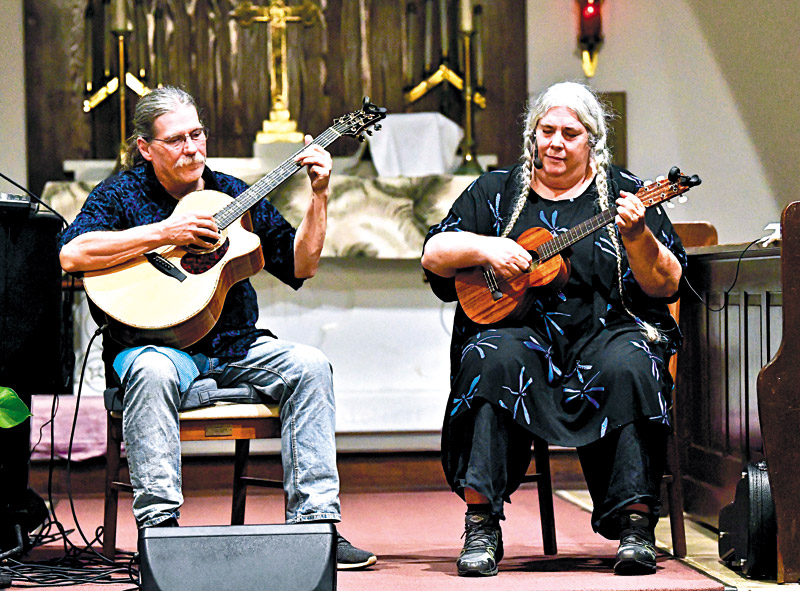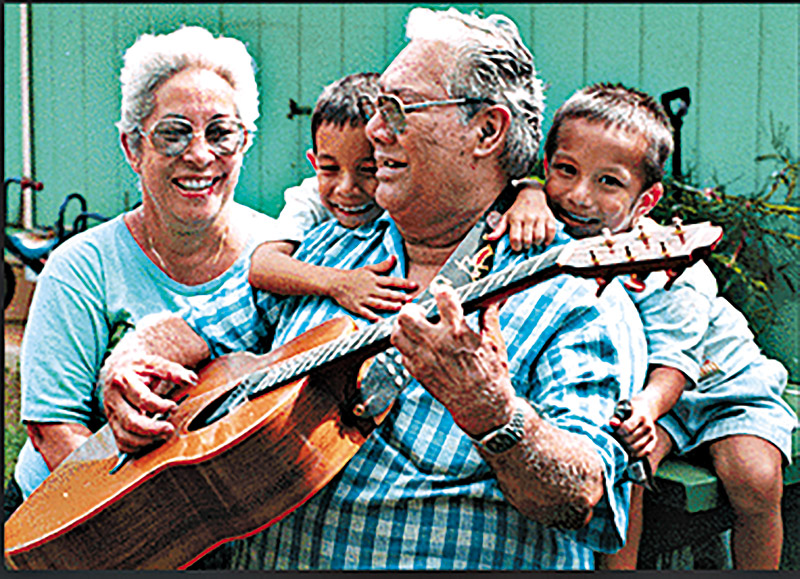The McMasters Of Music

Doug and Sandy McMaster have performed in more than 2,300 slack key concerts on the Garden Isle, all in an effort to carry on the tradition of the old-school genre.
Expect an evening of old-style slack key when Doug and Sandy McMaster pay tribute to genre front-runner Raymond Kane during a Dec. 28 concert in Hanalei.
Slack key guitar (kī hō‘alu) music was created in the 1780s by Hawaiians when a few guitars were left in their hands by Mexican cowboys contracted to teach Hawaiians how to manage cattle.
“This is why many of the elder slack key players tell their students that they should play so they ‘don’t wake up the cows.’ That’s the old style, the family style,” explains Sandy McMaster, who, along with her husband Doug, performs weekly slack key guitar concerts throughout the island.
Doug began playing slack key at the age of 6 after his father ordered him a Roy Rogers and Trigger guitar from a mail order catalog. Years later, in college, he taught Sandy to play the music that would strengthen their bond. Twenty-five years later, guided by love, trust and a shared sense of humor, the McMasters have performed more than 2,300 concerts. They remain committed to a mission, determined to not only perpetuate the craft they love, but also to honor all those who came before.
On Friday, Dec. 28, they will take part in a special tribute concert for Kōloa-born Hawaiian slack key guitar legend Raymond Kane, who died in 2008. Kane was a recipient of the 1987 National Heritage Fellowship awarded by the National Endowment for the Arts, which is the U.S. government’s highest honor in folk and traditional arts.
“Ray stayed focused on the old style, playing from the heart with great aloha,” says Sandy. “He taught players in the old Hawaiian way — watch and learn by experience. In his later years, he was very concerned that someone needed to carry this old style forward.”
The “old style” slack key techniques — altered tunings and finger-style playing — were developed out of necessity. At the time of its genesis, Hawaiians were unaware of traditional music “rules,” having to contend with the effect of the weather on instruments, as well as scarcity of instruments.
Traditional Hawaiian slack key is and has always been family music. For the first 180 years, each ‘ohana created its own guitar tunings and songs that were passed down from generation to generation in an oral tradition.
The performances are an opportunity for locals and visitors alike to become part of a bigger family, “a worldwide slack key ‘ohana, bridging cultures, languages and places.
Much of this was abandoned with the rise of contemporary entertainment. The music most commonly heard today is the modern form of slack key that was developed when business proprietors wanted entertainment that had rhythms and sounds familiar and popular to people coming to Hawai‘i from the mainland and elsewhere. Commercial radio in the 1920s brought in music from around the world, and slack key was literally jazzed up with chords and swing rhythms. Singing was added, and there were enough instruments for larger groups to perform.
This was not the traditional family style slack key of Kane, and he often wondered if the “old style” would be lost to history because it was so insular, often continued just for the family. Yet, because of Kane and the importance he placed on perpetuating this music, he helped to ensure that the slack key music he spent his life playing will be passed on.
For the McMasters, carrying on this style of music has become more than a calling. It is also about a promise made to those who came before.
About three years after Kane’s death, Sandy volunteered to help a group of people form a nonprofit, based on the desire to perpetuate traditional slack key. It was an arduous undertaking, and she felt that she would have to tell the group that they needed to get someone else to help them. She intended to tell them at their next meeting. Then the phone rang.
On the other end of the line was a familiar voice. It was Kane’s wife, Elodia, and the two talked for nearly two hours.
“Elodia spoke of how, in his last days, Ray was concerned about this old style being carried forward, and how happy she was that we were honoring Ray and his wishes,” Sandy recalls.
There’s no doubt that Kane and Elodia hold a special place in the hearts of the McMasters.
“Ray was the first to make Doug understand that playing traditional Hawaiian slack key is what his hand was made for,” Sandy says. “They have blessed us time and again, popping into our lives just as we needed kūpuna guidance. We owe them our lives, and we hope we are able to live up to the standards they set.”
Now that the elders have passed on, the McMasters believe they were chosen and directed to “fill their slippers,” as Sandy puts it. The main goal is to ensure traditional slack key and its players — like the Kanes, Keli‘i Māwae, Leonard Kwan, Moses Kahumoku and Uncle Sol Kawaihoa — are never forgotten.
“(They) touched our lives and shared their aloha along the way,” Sandy adds.
The McMasters describe their intimate shows as educational concert experiences.
The performances are an opportunity for locals and visitors alike to become part of a bigger family, “a worldwide slack key ‘ohana, bridging cultures, languages and places.”
The McMasters perform weekly concerts in Kapa‘a, Hanalei and Princeville. The Ray Kane Tribute Concert runs from 4 to 6 p.m. Dec. 28 at Hanalei Community Center. For more information on their concert schedule and ticket pricing, visit mcmasterslackkey.com.





